We have been contributing to the rebuilding of a church building and a congregation centre in Aleppo, Syria: the roof structure of the Armenian Evangelical community’s oldest church has been renovated partially with the help of Hungarian Reformed funds, and the Arab-speaking Presbyterian community’s new congregation centre is planned with support from the government of Hungary. The locals feel that these instances of support prove that God is indeed taking care of them in a tangible way.
‘The roof of the building was shattered by three missiles. The ceiling and the equipment in the building were damaged, the windows were broken, and the church interior could no longer be used.’ This is how Hovig Kerbabian, Chief Elder of the First Armenian Evangelical Emmanuel Church in Aleppo, recalls the events that took place three and a half years ago.
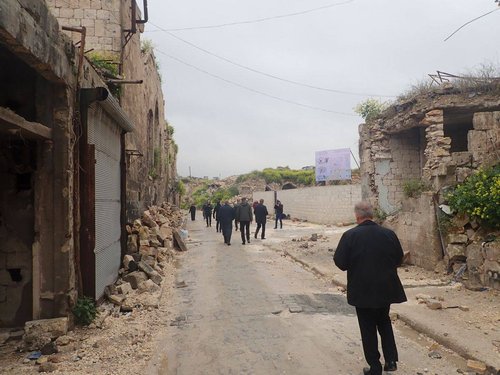
By that time, the community – founded in 1852 – had been operating without its own pastor for years, and yet the devoted elders gathered weekly in their church – built in 1923 – to pray and organise church services, inviting the pastor of the largest Armenian Evangelical community, Bethel Church, also located in Aleppo, to deliver sermons.
First task: rebuilding the church
‘When our church building was hit, the Reverend Haroutune Selimian kept visiting and encouraging us, giving us hope that we could renovate the church,’ adds the Chief Elder of Emmanuel. The Reverend, who is also the President of the Armenian Evangelical Community of Syria, left no stone unturned to try to secure funding for the rebuilding efforts.
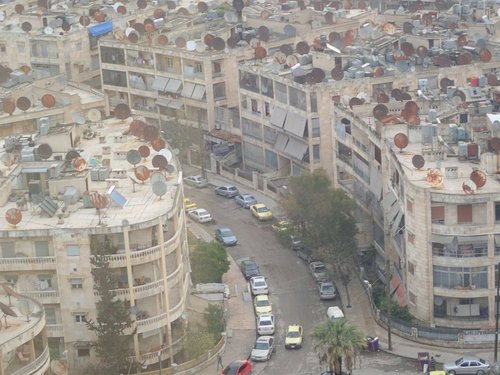
In December 2017, a year after the siege of Aleppo had been finished, a Reformed delegation from Hungary visited Syria for the first time. The radical troops had been forced out of the city, and everyday life was resumed amid the ruins, but the destruction that the city had suffered would remain an indelible reality for a long time for the locals, as most of the city centre had been completely destroyed in the fights. Countless houses, shops and centuries-old World Heritage sites have disappeared, replaced by nothing but ruins and rubble.
Locals explain that church buildings were the first to be fixed everywhere, only afterwards did people take care of their own homes. Several buildings of the local Protestant communities have been damaged, and until it was Emmanuel’s turn to receive help in the rebuilding process, the community continued to hold its church services in the basement of the church, which survived the fights. We were received under the gaping holes in the roof, yet the locals, even while picking up the pieces of their shattered lives, beamed with faith, strength and a willingness to live and serve.
Help from Hungary
In early 2018, the Reformed Church in Hungary (RCH) decided to forgo that year’s annual development funds to be received from the German aid organisation, Gustav Adolf Werk, and offered the sum – 10,000 euros – for the renovation of Emmanuel’s church. This amounted to less than ten percent of the renovation costs, but the project was also supported by the Hungarian government, among other foreign partners.
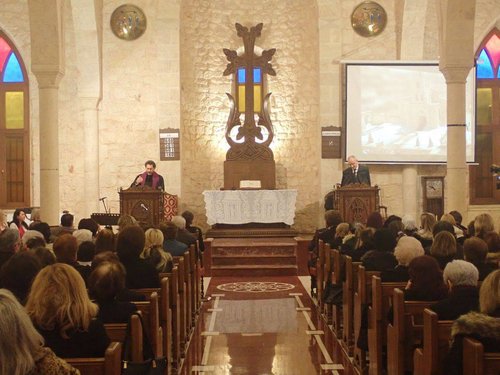
In October 2018 a delegation of our partner churches, representatives of both the Armenian and Arab-speaking Protestant communities in Syria visited Hungary. They met with Prime Minister Viktor Orbán, and through the Hungarian Deputy State Secretariat for the Aid of Persecuted Christians they each received one million euros for their efforts that enable local residents to stay in their homeland. 30,000 euros out of these funds were allocated to the renovation of the church building, thus completing the 160,000-euro project. Therefore the home of Emmanuel’s community, where they were able to return to last Christmas, has been rebuilt with a quarter of the funds provided by Hungary.
At the end of March this year, another RCH delegation travelled to the Middle East: this time our church leaders signed a Memorandum of Commitment with the National Evangelical Synod of Syria and Lebanon, the Union of Armenian Evangelical Churches in the Near East and the Fellowship of Evangelical Churches in Syria. The delegation visited the communities that had received funds from Hungary, finding out more about their projects, and on 30 March held a service in Emmanuel Church to express their gratitude together.
Blessing and peace in Aleppo
‘Your previous visit, your prayers and support strengthen us in our hope, in our commitment to God, because you have given us tangible proof that God is with us, and he is taking care of us,’ said the Chief Elder and the pastor, both deeply moved.
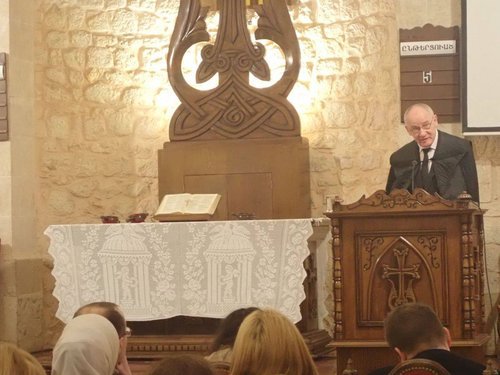
In between two songs of praise – a Hungarian and an Armenian church song – Bishop István Bogárdi Szabó recalled that the Reformed community in Hungary had been in a similar position after the Second World War, when a third of our churches had got seriously damaged. He encouraged participants to pass on the loving care they themselves had received: ‘We should let the Lord help us and give us opportunities, open up new roads in front of us, so that we can also help others.’
The newly renovated building is reminiscent of the simplicity and elegance of the Reformed church buildings in the Carpathian Basin. Only one element was missing: the painted, coffered ceiling. From now on, however, this feature is also present, albeit only in a symbolic way, since one of the church walls is now decorated with a present from the Hungarian delegation: a picture depicting a pattern typical in a Southern Transdanubian village, Kórógy, and those entering the Aleppo church building are welcomed by a sign saying ‘Áldás, békesség,’ the customary greeting among members of the Reformed community in Hungary, meaning ‘Blessing and peace’.
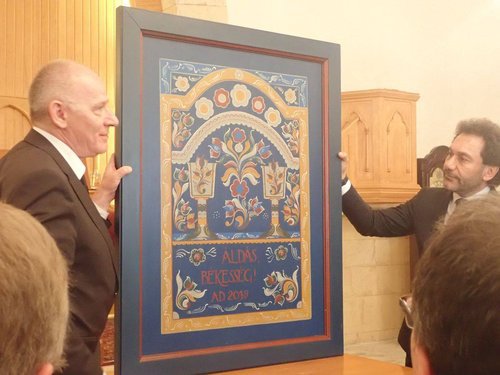
From rubble piles to community spaces
Emmanuel is not the only renovation project that is supported by Hungarian funding. The local Arab-speaking Evangelical community’s church building was completely destroyed during the fights, the only one in the city to have suffered such a devastating loss. In 2012 the church, located at the edge of the old town, farther away from the rest of the Christian churches, was first hit by a missile, and later blown up by terrorists. By the grace of God not a single person was injured and the congregation was able to continue its operations, moving into a new building, ten minutes’ distance from the original site.
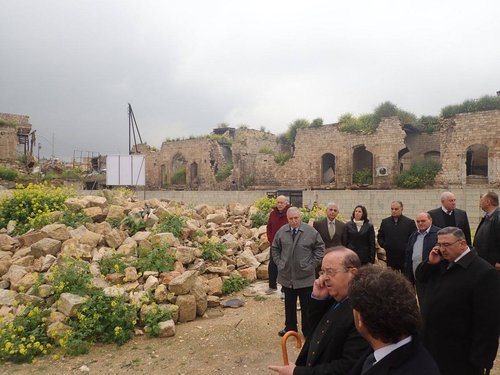
The property the church used to be on has nothing but depressing piles of rubble, yet the elders and engineers have already envisioned a congregation centre on the site. It is planned to be a single-storey building that would fit into the old town landscape, and would include a chapel, a convention centre, comfortable rooms, an underground garage and a spacious yard. The final plans are to be completed soon, and this preliminary work has been supported by the Hungarian Deputy State Secretariat for the Aid of Persecuted Christians.
The façade of the modern building – which is to house spiritual, communal and cultural programmes – will be designed to fit not only the landscape, but also international standards of historic preservation, but the actual construction will require at least two more years and one million US dollars. The rebuilding of Aleppo is hindered by the economic sanctions and recession that currently plague the country, and also by unsettled ownership issues, since there are many residents who have not returned home to this day. Aleppo’s community is suffering from wounds that are deeper, though less visible than the local landscape.
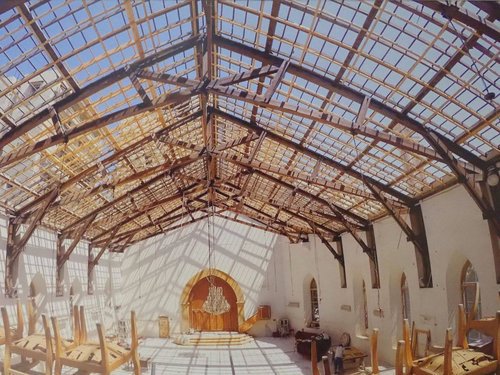
Our partner churches play an active role in alleviating the severe societal consequences of the prolonged war in Syria. Beyond providing humanitarian aid, they wish to facilitate the healing of emotional wounds caused by the war as well as reconciliation among religions through activities in their educational institutions and their Sunday schools, and also through other projects focusing on youth. These initiatives are also supported financially by the Hungarian Reformed communities of the Carpathian Basin.
The Hungarian government funds are to be used for the renovation and extension of the Armenian girl’s dormitory in Aleppo, and the boy’s dormitory run by the Arab-speaking church. Furthermore, some of the funds are allocated for the renovation of Bethel’s church centre, and for the extension of the doctor’s offices operated by them. The Armenian community’s school buses that have been destroyed during the war are also to be replaced, and the humanitarian programmes of both churches are also to be financed this way.
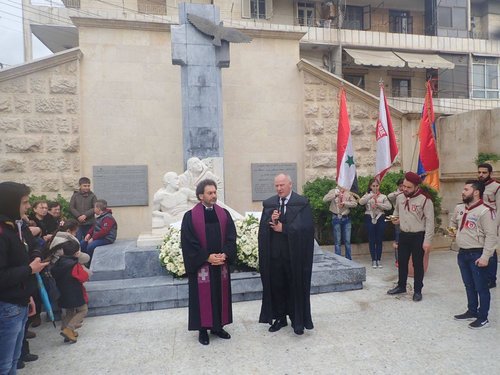
Written by György Feke
Translated by Erzsébet Bölcskei